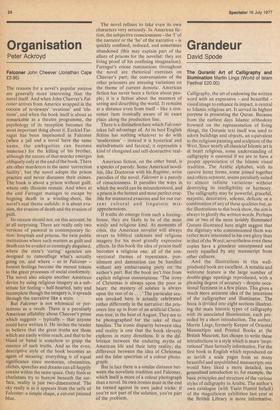Organisation
Peter Ackroyd
Falconer John Cheever (Jonathan Cape £3.95)
The reasons for a novel's popular success are generally more interesting than the novel itself. And when John Cheever's Falconer arrives from America wrapped in the cocoon of reviewers' ovations' and 'etaflans', and when the book itself is about as remarkable as a theatre programme, the psychology of its reception becomes the most important thing about it. Ezekiel Farragut has been imprisoned in Falconer (when a jail and a novel have the same name, the ambiguities can become immense) for the killing of his brother, although the nature of that murder emerges obliquely only at the end of the book. There are other murderers in the same 'correction facility', but the novel adopts the prison practice and never discusses their crimes. The book is about a prison without guilt, where only illusions remain. And when at the end Farragut manages to escape by feigning death in a winding-sheet, the novel's real theme unfolds: it is about evasion, the evasion of death and the evasion of guilt.
Its success should not, on this account, be at all surprising. There are really only two versions of pastoral in contemporary fiction: hospitals and prisons, the twin public institutions where such matters as guilt and death can be evaded or cunningly disguised, where the state's 'caring' agencies are designed to camouflage what's actually going on, and where — as in Falconer — human feelings become the merest tokens in the great processes of social conformity. The novel also adopts another American device by using religious imagery as a substitute for feeling — half-hearted, tatty and incomplete though the imagery is, it spreads through the narrative like a stain, But Falconer is not whimsical or portentous as a result. There is a peculiarly American affability about Cheever's prose which suggests — typically — that anyone could have written it. He invites the reader to believe that the great truths are those which are easily within reach, and that to be bland or banal is somehow to grasp the essence of such truths. And so the even, descriptive style of the book becomes an agent of meaning: everything is of equal significance since memories, obscenities, cliches, speeches and dreams can all happily coexist within the same space. Only fools or charlatans try to burrow beneath the surface, reality is just two-dimensional. The sky really is as it appears from the cells of Falconer: a simple shape, a cut-out painted blue. The novel refuses to take even its own characters very seriously. In American fiction, the subjective consciousness —the 'I' of the narrator or the 'he' of the narrative — is quickly confined, reduced, and sometimes abandoned (this may explain part of the allure of prisons for the novelist: they are living proof of his confining imagination) Farragut's otiose ruminations throughout the novel are rhetorical exercises on Cheever's part; the conversations of the other prisoners are amusing variations on the theme of current demotic. American fiction has never been a fiction about people; it is a fiction about the manners of seeing and describing the world, It remains at a distance even from itself — like a consumer item ironically aware of its exact place along the production line.
There is a distinction here which Falconer takes full advantage of. At its best English fiction has nothing whatever to do with 'modernism' — instead it is hysterical and melodramatic and farcical; it represents a kind of elongated and self-destructive realism.
American fiction, on the other hand, is a species of parody. Some American-novelists, like Doctorow with his Ragtime, write parodies of the novel. Falconer is a parody of consciousness. It parodies the ways in which the world can be misunderstood, and a prison is the hottest and most perfect crucible for mannered evasions and for our current cultural and linguistic misapprehensions.
If truths do emerge from such a forcinghouse, they are likely to be of the most windy and religiose kind. At moments of crisis, the American novelist will always revert to biblical cadences and religious imagery for his most grandly expressive effects. In this book the idea of prison itself becomes a religious one: all of the conventional themes of repentance, punishment and damnation can be handled without any embarrassing piety on the author's part. But the book isn't free from explicit religious connotations: 'The irony of Christmas is always upon the poor in heart: the mystery of solstice is always upon the rest of us. . . 'The particular season invoked here is actually celebrated rather differently in the narrative: the prisoners line up in front of an artificial Christmas tree, in the heat of August. They are to be photographed for the sake of their families. The ironic disparity between idea and reality is one that the book cleverly explores in many directions. It is the difference between the enduring myths of American life and their tatty reality; the difference between the idea of Christmas and the false spectriim of a colour photograph.
But in fact there is a similar distance between the novelistic tradition and Falconer, which itself is more of a colour photograph than a novel. Its own ironies must in the end be turned against its own jaded tricks: if you're not part of the solution, you're part of the problem.


































 Previous page
Previous page